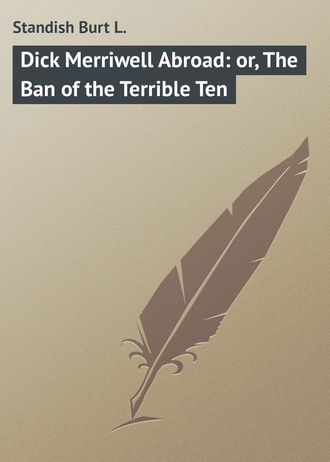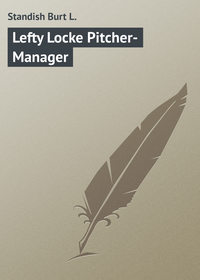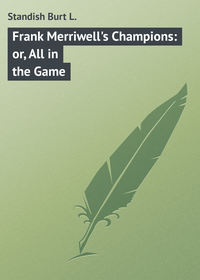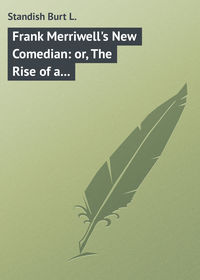 полная версия
полная версияDick Merriwell Abroad: or, The Ban of the Terrible Ten
“I’m afraid it is,” confessed Dick.
CHAPTER XXIV. – MARO AND TYRUS
Having beaten off the two Greeks, neither of the boys had a thought of surrendering the girl. They were determined to protect her, no matter what happened, until they could get word to Cavendish, who, she asserted, was somewhere in Athens.
Tyrus made no objection when he saw the lads and the old professor departing with the girl in their midst. He sat up, staring after them, a wicked look on his face.
Barely had Zenas, the boys, and the girl disappeared from view when Maro reappeared amid the ruins of the Parthenon and ran swiftly to the spot where Tyrus sat.
“Why do you sit thus?” he demanded. “Did you not see them taking Flavia away?”
“I saw them,” was the gruff answer.
“Then why did you permit it?”
“Why did you permit it?”
“You are her uncle.”
“You are her lover.”
“But you have the power.”
“It is, indeed, little power I had after being dashed against this slab of marble.”
“But yours is the authority.”
“They are Americans.”
“What of that?”
“Americans recognize no authority but that of might. They are wonderful fighters.”
“They fight like fiends!” exclaimed Maro. “Who could think that those boys would dare attack us! And I was armed with a knife.”
“Little good it did you,” returned Tyrus, with a touch of scorn. “I had no weapon, and I would have mastered one of them had not the old man attacked me, scratching and clawing like a cat.”
“But you are going to let them carry Flavia away?”
“You have as much right to stop them as I have.”
“No, no!” almost shouted Maro, in great exasperation. “You have the right, for you are her uncle. You must do it!”
“I like not your language, Maro. No man has ever told me I must do a thing.”
“But you let them walk away with her?”
“Because the young man, strong and able to battle for his rights, fled and sought shelter in hiding. Maro, I sadly fear I have been much mistaken in you. I fear you are a coward.”
The younger man flushed with mingled anger and shame.
“What was I to do?” he demanded, seeking to justify himself in the eyes of Tyrus. “I saw that you were stretched prone upon the ground, and I feared you had been slain. I was disarmed, and that terrible American boy was hitting me so fast that the blows could not be counted. I knew that, in another moment, I would have all three of them upon me. I fled to save my life.”
“You saved it,” said Tyrus, still with that biting touch of scorn. “You saved your life, but it may be that you have lost Flavia.”
“Never!” grated Maro. “I will follow and take her from them!”
“Alone?” asked Tyrus, with that same manner. “You ran from one of them, but now you propose to follow and conquer all three of them. Indeed, Maro, your words and your behavior are inconsistent.”
“We are losing time!” exclaimed Maro.
“We? Why, I thought you were going to do it quite alone.”
“It is you who must lodge the complaint against them, as you did against the Englishman, for you are the uncle and guardian of Flavia.”
“Oh, so you advise that we seek the assistance of the law?”
“It is the better way.”
“In truth I doubted if you actually intended to attack those American fighters, even though you spoke so boldly. You have had quite enough of that, Maro. You still insist that Flavia must be your bride, even though you know now that she scorns you and would prefer death?”
“She is my light, my life! I must have her! You have given me your word that she shall be mine.”
“But I had no thought that she would make such a terrible resistance. She has ever been a good and dutiful girl since her father left her in my hands. I knew she was averse to you, Maro, but I fancied you could overcome her aversion, or that she would dutifully submit at my command. She has in her the spirit of her father’s family. He married my sister even though I hated him and sought to prevent the union. Maro, he loved her, which I hold to his credit. He was a good husband to her, and he nearly died of grief when she passed from earth and left little Flavia. It was for Flavia that he lived. Otherwise I believe he would have taken his life that he might join her. But when he met reverses and lost most of his little fortune, he felt that bad fortune had placed a blight on him while he remained in his native land. He found an opportunity to go to India, and he left Flavia with me, charging me to be like a father to her. It is now said by this Englishman that he has prospered in life, and by this Englishman he sends a message which tells me to let Flavia return to him in care of the Englishman.”
“A trick! a trick!” cried Maro fiercely. “The letter was a forgery!”
“How do you know?”
“The Englishman and Flavia met before he presented that letter.”
“Which is true.”
“She fell in love with him.”
“Her behavior seems to denote it,” confessed Tyrus.
“She knew I wished to marry her and that you favored me.”
“Go on.”
“The Englishman smiled on her. She was deceived. She told him of her father. Perhaps she gave him some letters from her father. Either the Englishman forged the letter, or he employed an expert to accomplish it. In this manner he means to steal her from you and from me.”
“It is possible you speak the truth.”
“I know I speak the truth! I feel it here in my heart! He is deceiving her. He would take her away, pretending that it is his intention to conduct her to her father; but in truth he has no such intention, and when he becomes tired of her he will desert her. I am right, Tyrus. She will be left to die in some foreign land by this young dog of an Englishman, whose father is rich and who has money to fling about with a lavish hand. It is your duty – and mine – to save her from such a fate! Arouse yourself, Tyrus! Bestir yourself, and let’s do something without delay. The Englishman has been placed beneath arrest. It is our next move to enter complaint against the Americans and have them arrested also. It can be done.”
Tyrus bowed gravely.
“It can be done,” he agreed; “and, as you say, it may be our duty to see that it is done.”
“Then delay not. Every moment is precious.”
“Give me your hand,” said the elder man.
Maro assisted him to rise.
“It was a terrible shock I received,” muttered Tyrus, moving his shoulders and making a wry face. “It is most remarkable that my neck was not broken. Even now to move at all causes me discomfort, and to-morrow I fancy I will be exceedingly lame.”
“Think not of yourself,” urged Maro, burning with impatience and seeking to pull Tyrus onward. “Think of Flavia and your duty to her. Hasten!”
“Wait a little,” said the elder man. “I am dizzy. My head reels. It is a singular sensation, for all my life I have been strong as the horse.”
Indeed, he swayed and might have fallen but for the supporting arm of the young man.
“Oh, these Americans!” he muttered. “Even mere boys, scarce escaped from the nursery, seem to have the courage, skill and strength of men. What a wonderful people they must be!”
“Bah! I admire them not, for ever it is that an American and an Englishman will unite against one of any other nation. They speak one language, and there is between them a bond of sympathy stronger than they themselves dream. Has the Astrologer of Minerva not said that some day they will unite and rule the world. I admire them not, I tell you! Come, Tyrus, they will escape with Flavia, and we – ”
“We will find them, never fear. They shall soon be placed in confinement and kept there until Flavia is yours. I think I can walk now.”
“Then hasten, hasten!” urged the impatient and baffled lover.
CHAPTER XXV. – TWO ENGLISHMEN
Zenas Gunn strutted like a peacock. He seemed to feel that he it was who had accomplished the feat of baffling the girl’s pursuers. For a time he put aside his fear of further trouble over the affair, jogged along at her side and talked fluently with her in the language she could best understand.
They left the plateau by way of the marble gate and hastened to descend.
“Trust us, my dear child,” said the professor.
“I do,” she declared, smiling on him in a manner that made him throw out his chest still further. “But, oh, I fear Tyrus and Maro! They are determined that I shall never see Charlee again.”
“Hum! hem! How long have you known this Charlie?”
“It is not long. He is the most beautiful man in all the world!”
“You should have seen me when I was younger,” said Zenas. “I beg your pardon, but I do not think we have learned your name?”
“It is Flavia.”
“Beautiful name,” declared the professor. “Look out, my child, do not stumble there.”
“There is no danger that I will stumble, but you – ”
“Oh, I’m as frisky as a young colt! Didn’t you see me put Tyrus to the bad a while ago? Don’t worry about me.”
“The old boy is getting along some!” observed Brad, speaking to Dick, as they followed Zenas and the girl. “It takes a young girl to wake him up and make him lively.”
There was a shadow on Merriwell’s face.
“It was our duty to protect the girl,” he said; “but now it would be an absolute relief if we knew where to find this Englishman, Cavendish. There is going to be a great rumpus over this, and we may find ourselves in a pickle because we took the part of this maid of Athens.”
“The Maid of Athens!” exclaimed Brad. “That’s the title for her! It fits her. By the great Panhandle! if it wasn’t for Nadia Budthorne – ”
Dick laughed.
“Brad, you’re smashed! She has a fellow – Cavendish. And that is not mentioning Maro.”
“Hang Maro! He doesn’t count any whatever.”
“But Cavendish does.”
“He’s lost in the shuffle.”
“Well, there is Nadia, and you – ”
“She’s all right!” exclaimed Brad sincerely; “but she isn’t here, and I opine I’ve got a right to admire the Maid of Athens some.”
“But no right to make love to her.”
“No danger of that, pard,” grinned the Texan. “I never did cut much ice with the girls. You always were the one, and it’s a wonder to me that this girl didn’t forget Charlee the moment she placed her sky-blue eyes on you.”
“Oh, that will about do!” laughed Dick. “You’re forever imagining that girls are struck on me, when the fact is that they are not, and – ”
“How about Doris Templeton?”
“Mere friendship.”
“Is that so? How about June Arlington?”
“Friendship just the same.”
“Well, then, how about – ”
“That will do! Don’t try to make me out a chap with a dozen girls!”
The Texan chuckled.
“Don’t you get gay with me,” he advised. “I can come back at you good and plenty.”
By this time they were well down toward the base of the Acropolis. Suddenly Flavia uttered a wild cry of joy, broke from Professor Gunn and ran toward two men who were approaching.
One of the two was a very young man, with a delicate mustache on his lip, while the other was middle-aged, florid and puffy, carrying a heavy cane. The younger man had seen Flavia the moment she discovered him, and he sprang toward her, his hands outstretched.
“Galloping jack rabbits!” exclaimed Buckhart. “Whatever does this yere mean?”
“It means,” said Dick, with satisfaction, “that we’ll not have to search all over Athens for Charlee.”
“I’m almost sorry,” declared Brad, with a comical twist of his face. “She didn’t have time to discover how much superior I am to Charlee.”
Professor Gunn looked both relieved and disappointed. He had feared they would get into serious trouble, yet now he was disappointed by the appearance of the Englishmen.
For Englishmen they were, beyond question. The elder man had the appearance of a man of the world, given to special delight in the good things of life. He surveyed the boys and the professor with mild curiosity. His eyes were rather bleary and blood-shotten.
At first Flavia was too overjoyed to make an explanation, but finally, in a confused torrent of words, she told what had taken place on the plateau of the Acropolis.
The face of the young Englishman brightened as he began to understand how she happened to be escorted by Professor Gunn and the boys.
“So you went there thinking you might meet me, Flavia?” he said. “It was on my way to view those ruins that I first met you, and you remembered. I fancied you might, don’t you know, and that is why I am here now. I found you had been removed from your home, and I could not trace you. It is pure chance, but, by Jove! luck is with us.”
Then he turned to the Americans.
“Gentlemen,” he said, “my name is Cavendish – Charles Cavendish, son of Sir Henry Giles Cavendish, of Grantham. This is a particular friend of our family, Sir Augustus Camberwell. I wish to thank you most heartily and sincerely for your brave defense of Flavia. Permit me to shake hands with you all.”
“Yes,” said Sir Augustus, “very gallant, really. Just like you queer Americans. Never stop to inquire into an affair where a woman is concerned. Always go in and stand by the woman. Splendid sentiment, but dangerous.”
Sir Augustus now turned his attention to Flavia, at whom he gazed in a manner that Dick did not fancy.
“Very charming, my dear Charlie,” he admitted. “I’m beginning to understand how it happened. Oh, you rascal! Where would you be now if I wasn’t in Athens? Why, you would be in jail. It took my influence to get you out.”
“For which I thank you most sincerely, Sir Augustus.”
“All right, my boy – all right. But you want to remember my advice. You want to remember what I told you about getting in too deep. Oh, you rascal! you’re going to be another case with the girls, just as your father was before you. Many’s the little toot we’ve been on together, and Henry always was getting entangled with a female.”
“Well, what do you think of that, pard?” whispered Buckhart, in Dick’s ear.
“I think Sir Augustus is smelly,” was the answer.
Professor Gunn was likewise far from pleased. He regarded the older Englishman with an air of pronounced distrust and suspicion.
“Don’t worry about me, Sir Augustus,” advised Cavendish.
Just then, happening to glance up the path they had lately descended, Professor Gunn uttered an exclamation of alarm and warning.
“Look – look, boys!” he cried. “There come the Greeks!”
Maro and Tyrus were to be seen descending the path.
Flavia was greatly alarmed in a moment.
“Let them not touch me, Charlee!” she entreated, clinging to Cavendish.
“Never fear,” he said reassuringly. “They shall not.”
“But I opine we’d better be moseying along out of this,” said Buckhart.
To this the others agreed, and they lost no time in moving.
CHAPTER XXVI. – WAS IT A MISTAKE?
Although the Greeks pursued them into the city, they made no attempt to recover possession of Flavia.
What they did do, however, was something alarming.
At intervals they called to other men, friends or acquaintances, and many of these joined them in following the girl and her escort. This little band of dogged pursuers grew by ones and twos until there were in all at least ten of them.
Professor Gunn’s agitation grew as the number of pursuers increased.
“Boys,” he said, “I sadly fear we are going to have grave trouble. It would not surprise me if we were attacked and murdered right here in the city of Athens. I am in favor of calling for protection by the ‘Agents of Peace,’ as they call the police here.”
“Now, don’t you know, really I wouldn’t do that,” objected Sir Augustus Camberwell. “Really I wouldn’t.”
“Why not, sir?”
“On account of the girl, don’t you understand! The blooming Agents of Peace might ask us to explain what we are doing with the girl and why we withheld her from her uncle, don’t you see! Don’t have anything to do with the Greek bobbies. We have but a short distance farther to go – a very short distance.”
So the Agents of Peace were not appealed to by them, and at last they reached the hotel where Sir Augustus and Charles Cavendish were stopping.
“I have to thank you very much for your gallant protection of Flavia,” said Cavendish, again shaking hands with the boys and the old professor. “She has explained fully how you risked your lives for her, as that crazy fellow, her uncle wishes her to marry, drew a knife on you. It is really wonderful that two boys and an old man should be able to stand those two ruffians off.”
“Old man!” exploded the professor indignantly. “Who are you calling an old man, sir? I would have you understand that I’m younger than lots of men half my age.”
“No offense, professor,” Cavendish hastened to say. “You are indeed remarkably young for your years.”
Zenas sniffed and hemmed in a manner that denoted he was not fully pacified.
Both Cavendish and Sir Augustus seemed anxious to get rid of the Americans.
Maro, Tyrus, and the rest of the pursuers had now disappeared, and, therefore, Dick proposed that they should return to their hotel.
Not until they were far away and had failed to discover further signs of their pursuers did Professor Gunn throw off his nervousness.
“I tell you, boys,” he said, “this has been a very serious affair – very. Of course, we may yet have trouble over it. There is no telling. I can’t understand why we were not attacked by that band of men who gathered to follow us. It is certain that the Greek of to-day is not much like the Greek of old. In ancient times we would have been overwhelmed and slaughtered like dogs.”
Dick was silent and moody. He seemed thinking of something that was far from pleasant. Even after they had reached their hotel and were in their rooms he maintained an air of gloomy thought.
“Whatever is troubling you, pard?” questioned Brad, when the professor had retired to his room.
“I am thinking of Flavia – poor Flavia,” answered Dick. “Her situation bothers me, Brad. I almost fear we made a mistake to-day.”
“I’ve been thinking some that same way,” declared the Texan, springing up and beginning to pace the floor with long strides. “I sure didn’t like old Augustus any, and Cavendish didn’t hit me any too well. You don’t suppose that young snipe is fooling that girl, do you, Dick?”
“That is a hard question to answer. There is something queer about this affair. Flavia says Cavendish is going to take her to India, where her father is; but still they met by accident on the Acropolis or near it. If Cavendish was sent here by the father of Flavia, why didn’t he come direct to the girl?”
“You tell!”
“Sir Augustus is an old rascal, and from his manner I inferred that he held the idea that Cavendish is crooked. Brad, if we have been instrumental in getting that beautiful girl into trouble, instead of helping her out of trouble, I’ll never forgive myself.”
“What are we going to do, Dick?” asked the Texan, gravely.
“Perhaps it is our duty to go to the headquarters of the Agents of Peace and tell all about it.”
“And get up to our necks in trouble, sure as shooting.”
“I suppose so. Sir Augustus must have influence, for he got Cavendish out of the jug in a hurry.”
“Filthy lucre did it, partner. It will do almost anything in these days. Somehow I opine that old Tyrus doesn’t rate very high in the family line here, and it’s likely good coin would cause the authorities to wink at an intrigue between a gay young Englishman and a girl of poor family.”
At this moment Professor Gunn came prancing back into the room, very much excited in manner.
“I was sure of it!” he squawked, shaking a quivering finger in the air. “I was sure I had heard of that old reprobate! I looked over my notes. Boys, he’s a miserable old rounder! He’s a man with a bad record! He ought to be in prison! He would be in prison if he had his just deserts! He disgraced himself and his family in England! He left his own country on account of his reputation. That’s the kind of man he is.”
“Who are you talking about?” asked Dick.
“Sir Augustus Camberwell,” answered the professor. “And he’s the friend of Cavendish!”
“Now we know how the land lays, partner,” said Brad.
Dick rose to his feet, catching up his hat and light topcoat.
“Come, Buckhart,” he said grimly.
“What are you going to do?”
“I’m going out to get some air. I’m afraid we have been chumps of the chumpiest variety.”
“I’m with you,” said the Texan.
“Boys, boys, boys!” spluttered the professor. “I hope you are not going to do anything more that is rash. I can’t permit it. I must object. I must put my foot down.”
“Don’t worry about us, professor,” said Dick. “I feel the need of a brisk walk to cool off. My indignation is getting the better of me.”
Zenas hurried to the door.
“You shall not go until you promise me you will do nothing rash,” he declared. “I shall not permit you to leave this room.”
Dick managed to appease and reassure him in a short time, and soon he left the hotel, accompanied by his chum.
“What’s your plan, pard?” asked Brad, as soon as they were on the street.
“I’m going direct to Cavendish and Camberwell,” said Dick. “Unless Cavendish can satisfy me beyond the shadow of a doubt that his intentions toward Flavia are perfectly honorable, I’ll denounce him to the authorities, and push the matter against him, even if I go to jail myself for it!”
“Whoop!” cried the Texan. “That’s the stuff! We’ll take to the warpath, Dick, and there will be things doing in Athens. You hear me shout!”
CHAPTER XXVII. – THE PURSUIT
Although it did not take them long to retrace their steps to the hotel where they had left the Englishmen and the Greek girl, they met with a most surprising disappointment when they arrived there. They were informed that Cavendish, Camberwell, and Flavia had just left in a closed carriage. The carriage was pointed out to them, just disappearing down a street that seemed to lead toward the outskirts of the city.
Only a moment was Dick Merriwell nonplused. Then he called for saddled horses, and the money he displayed brought him the assurance that his wants should be supplied.
“Lose not a second,” he ordered. “We must overtake that carriage.”
Buckhart was burning with impatience, but he bemoaned the fact that they were not armed.
“Oh, for a brace of revolvers now!” he cried. “If we had the guns we certain would take that girl away from them.”
“We’ll take her anyhow,” declared Dick grimly.
Brad did not ask how they were going to do it, for he had perfect confidence in his bosom friend. If Dick said they would do a thing, that settled it – it was as good as done.
So it happened that in a very few moments the two daring American boys were mounted and riding at a breathless gallop along the street of that Greek city.
The carriage had disappeared from view some time before, but the boys kept on, hoping fortune might be with them.
Not far from the outskirts of the city Dick paused to question some laborers. One of the men could speak good English, and he immediately declared that he remembered the carriage. He directed them, and they were soon galloping onward once more.
The street they now followed quickly brought them to the open country outside the city. In the distance lay some low, rugged hills, which from that point seemed rather barren and forbidding. The road led up a steep incline.
“Pard,” said Brad, “I’m sure afraid we’ve missed them. We can’t see anything of them anywhere.”
“Perhaps we have,” admitted Dick; “but let’s get to the top of this hill and take a survey.”
They clattered up the hill. Near the crest, the road wound round the shoulder of an immense bowlder, which was fully as large as a small cottage.
Sitting on the ground with his back against the rock and his body in the sunshine, being fully protected from the rather chill wind that swept the top of the hill, was a ragged beggar. He held out his open palm to them.
“Drachma,” he said. “Drachma.”
“Whatever does he mean by that?” asked Brad.
“Money,” said Dick. “Evidently he takes us for wealthy foreigners, else he would not ask for drachma, which has a value of something like twenty cents in our money.”
Dick produced a coin and tossed it shimmering toward the beggar, who deftly caught it.
Then the boy began to question him, using a little “modern Greek” and many signs. The beggar was grateful and seemed anxious to understand and aid Dick. He even rose to his feet and drew nearer.









